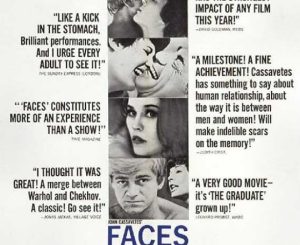
Faces is a real treat. I bet if you were able to sit down with Coppola and ask him about where the stylistic influence for The Conversation came from, he would admit to having ripped off Cassevete’s Faces. Unlike Coppola’s film, the story in Faces is minimal, and that is being generous. For what it is worth, suddenly, a husband and wife separate after 14 years of marriage. He falls for a hooker, she for a lady-killer at a local club. Less than 24 hours later, both man and wife are horrified at their own and each other’s behavior. The end. Faces is concerned with typical American suburban malaise. As the husband announces in the beginning of the movie, “Let me list out my maladies for you.”
Again, I compare Faces to The Conversation only in terms of style, in the almost Dogma 95 use of sound and camera. The only music comes from records or DJs. The camera darts back and forth, so that a conversation between two people is captured in one take. While not going into my own personal pantheon of great films, I would not object in the slightest to watching Faces a few more times.
What most impressed me about Faces is that here you have a film with maybe ten scenes total. Yet its length is over two hours. Cassevete’s and cast held my attention throughout. I need to reiterate that the scenes are not overly long. They are longer than normal movies scenes, but as our own Matt Cale states so perfectly in his review of Once Upon a Time in the West, Cassavetes is, “willing to let scenes play as they must without rushing to the next dramatic development.” To me, allowing a scene to roll out to its own prescribed climax gives the viewer two things they would not get from a “normal” film. One is more time to digest what was just on screen.
This is only important if the movie is worthwhile, of course, but when the film is more than acceptable, long scenes become like kicking back after a nice meal with some booze and tobacco rather than rushing on to the next activity. In other words, you are afforded the opportunity to take in as much as possible. Full digestion. In Faces we are able to understand not only the husband’s (John Marley) seemingly sudden decision to ask for a divorce, but we also can see his wife’s character, value and charm and why this is no easy step. No snap decision. Again, all from one scene.
he second thing that longer scenes allow for (and Faces excels in this particular department), is what I can only term the “roller coaster effect.” This is when a scene’s or a story’s emotional pendulum gets swung from one side to the other and then most likely back again; but maybe even in a totally different direction. Robert Altman is the king of this particular cinematic technique. See The Player. Cackling laughter to full-on remorse to some other lighthearted emotion–up and down like a roller coaster. Needless to say, Cassavetes is no slouch at this. In one particular scene, a man named Jim McCarthy (Val Avery) just about runs the gamut of possible emotions; the highs of sexual lust to the lows of self-realization to animalistic territorial pissing to blind male comradery and cronyism.
Again, all within a single scene! Why this is good is of course a matter of taste, but I feel it greatly enhances a movie, and this movie in particular, by breaking the characters out of their molds. By making them multi-dimensional, multi-faceted. These are not typical Hollywood “types” or caricatures; the cast of Faces are real people. At least as real as a two hour peek will let us see.
In the end, Faces, while being almost entirely enjoyable, is a tad dated. Possibly in need of a remake. I say this only because here we have a movie almost totally devoted to human impulse to screw, and there is almost no screwing whatsoever. None of the hookers have dirty mouths. None of the johns mention sex. The one time the actual act of sex is brought up, it is referred to as “making love.” Still, being stuck in the societal norms of 1960s Hollywood does produce a few good sequences that would be lost on any remake.
First and foremost is the absolutely brilliant part where the husband and wife are discussing cunnilingus. Worth the price of the rental alone. Another good one is a throwaway line from a stand up comic in the nightclub who wants to be the first to “surrender” to the Great Society’s new war on poverty. Brilliant. And yet another is the first sixty seconds or so of the film–possibly the most misogynistic minute in the history of cinema. You are going to have to watch to believe. Also of note is Seymour Cassel as the gigolo–I love that guy. And finally, Lynn Carlin, who plays the wife, is super hot.
Leave a Reply